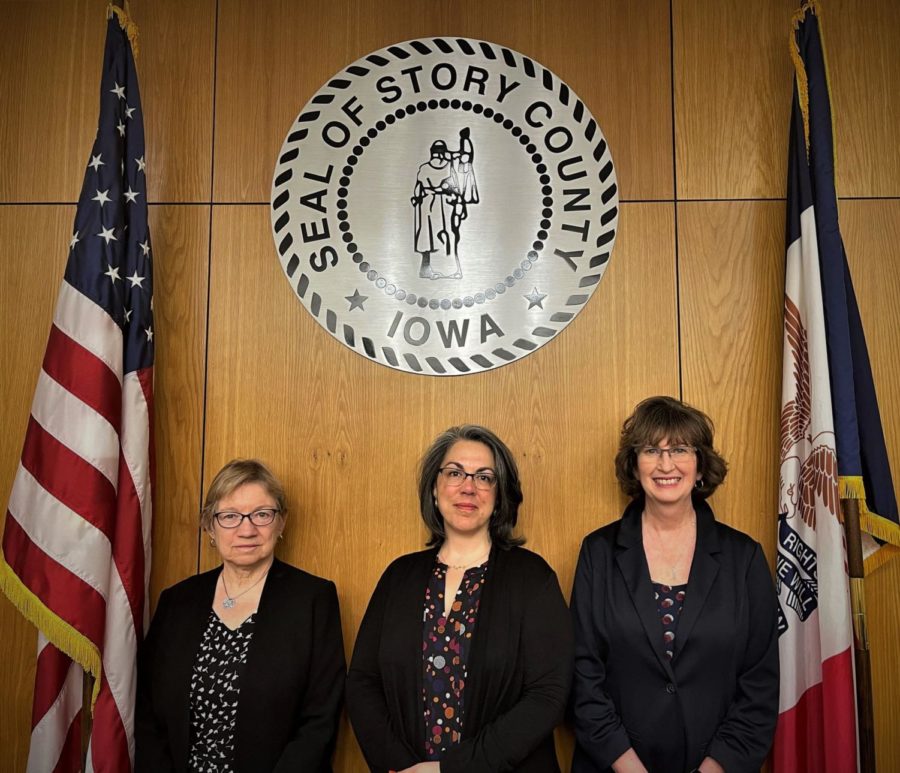County supervisors pass carbon pipeline ordinance
$50,000 grant moved to fund childcare
Photo courtesy of the Story County website
Story County Board of Supervisors includes Linda Murken, Latifah Faisal and Lisa Heddens.
The Story County Board of Supervisors moved to pass an ordinance that aims to impose regulations on carbon pipelines proposed to run through the county.
The supervisors moved to waive a third hearing of the ordinance and passed it at Tuesday’s meeting. The supervisors only have the authority to regulate carbon pipelines, not dictate whether or not they are constructed.
Story County Planning and Development Director, Amelia Schoeneman, told the Iowa State Daily over email the ordinance was made by analyzing research that most mirrored the conditions of Story County.
“We then further investigated studies […] that provided a range of distances for the dispersion of these concentrations based on various diameters of pipeline,” Schoeneman said. “This allows our ordinance to have different setbacks based on pipeline size (distance of dispersion is based on the volume released, among other factors, and the volume released is in part based on pipeline size and pressure).”
As this was the second hearing on the ordinance, the supervisors had little conversation on the line item.
The supervisors also moved to approve an ordinance that now defines barns of historical significance as eligible for adaptive reuse. Previously, barns were excluded from being eligible for adaptive reuse. Under the new ordinance, owners of historic barns may now apply for a conditional use permit.
The ordinance also has allowances for other historic places and structures considered local historic landmarks or registered on the National Register of Historic Places.
The supervisors also moved to waive a third reading on the ordinance, as this one was passed on its second hearing.
Ames Economic Development Commission
The supervisor moved to grant $50,000 to the Ames Economic Development Commission for childcare needs to match a grant the commission applied for but has not been approved yet.
Nikki Fischer, director of workforce development and diversity for the Development Commission, said the money would help the community of Colo, Iowa, which currently lies in a childcare desert.
“On the DHS website, the orange dots are spots where it’s lacking, blue dots mean there is sufficient childcare,” Fischer said. “In Story County, most of the blue dots are in the Ames area, and anything outside of that really is a desert.”
Fischer said, from information provided by the Iowa Women’s Foundation Business Report, that 85% of parents or guardians wish their employer offered childcare benefits. She added parents or guardians miss an average of 4.3 days of work per year due to childcare, and 65% of parents or guardians are late to work due to childcare.
Fischer provided the supervisors with a brief list of what the funding would go toward, including:
— A sidewalk.
— A security door.
— Smaller chairs and tables.
— Essential training such as CPR and first aid.
— Storage space for the children, such as cubbies or lockers.
Fischer also provided the supervisors with a drafted budget, which emphasized the development commission’s intention of keeping Colo’s childcare needs sustainable without the need for future funding.
“The only thing I don’t have listed is the funding from the businesses as well it would have made it a lot smaller to see because there are a lot of different businesses,” Fisher said, “so I just wanted to note that it isn’t just the [governors] grant and the ask from the supervisors, there’s several other employers and businesses that are actually going to go into this budget and help get it off the ground and continue it.”
The prospective childcare project aims to add 60 slots of childcare to the Colo community.
Your donation will support the student journalists of the Iowa State Daily. Your contribution will allow us to purchase equipment, send our student journalists to conferences and off-set their cost of living so they can continue to do best-in-the-nation work at the Iowa State Daily.











